2 Childhood Friends in Bengaluru Are Making Stationery Sustainable with 500 Tonnes of Recycled Paper
“People don’t realise it, but every sheet of paper they use could be saving a tree or cutting one down. We chose the former,” says Naren Raj, co-founder of ‘Rescript’.
In Bengaluru, where tech giants dominate skylines and startups arise in every corner, two childhood friends are scripting a very different kind of success story, one rooted not in code or capital, but in discarded paper, environmental values, and a shared vision for sustainable change.
Their story began in a forgotten spare room, cluttered with old furniture, and has now grown into a nationwide brand that is reshaping the way India looks at paper.
“We were interested in becoming entrepreneurs, and our interest always lay in the sustainability sector. We took time in trying to figure out what we exactly wanted,” reflects Ashutosh Ananth, the other founder.
From that humble beginning, Rescript has gone on to recycle over 500 tonnes of waste paper, save more than 9,200 trees, preserve 18.4 million litres of water, and prevent over 4,31,480 kilograms of carbon emissions.
Their impact is not only determined by the metrics, but it is also about the conscious shift they are enabling in everyday behaviour, where a sheet of paper becomes a small but significant act of environmental responsibility.
From nursery school buddies to venturing into the sustainable world
Naren and Ashutosh’s friendship dates back to nursery school. Their friendship grew through their years at St Joseph’s and solidified during their BBA studies at Christ University. Even then, they talked about starting something together.
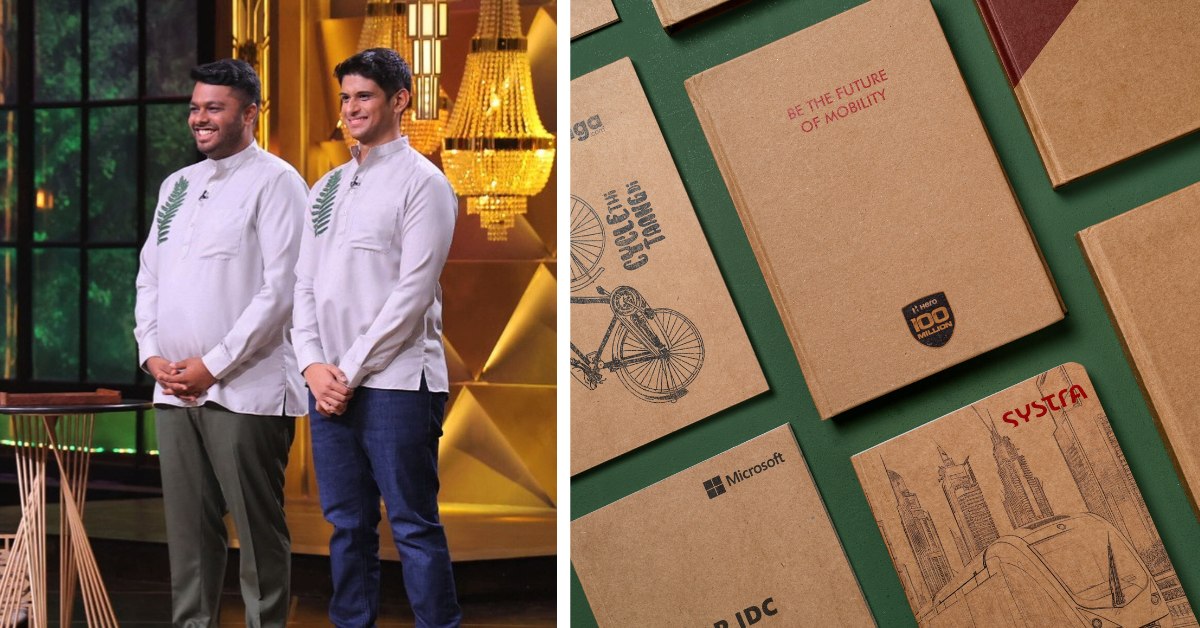 The co-founders of Rescript always wanted to start something in the sustainability sector
The co-founders of Rescript always wanted to start something in the sustainability sector
After graduating in 2016, life took them briefly down separate paths. Naren joined Ernst & Young but quit within two months. “I just did not see myself in the corporate world, I needed to build something from scratch,” he tells The Better India. Ashutosh, meanwhile, worked with relatives in a family-run company for two and a half years before parting ways.
The two continued to meet and explore ideas. Their turning point came in 2019, when a mentor introduced them to a Delhi-based manufacturer producing plantable stationery, items embedded with seeds that could grow into plants after use.
“We thought it was brilliant, stationery that lives on even after it is used. It gave us our first sense of what a sustainability business could look like,” Ashutosh recalls.
They travelled to Delhi, met the supplier, secured a feasible costing, and returned to Bengaluru with samples in hand. With the help of a few corporate connections, they pitched the idea to EY, which placed a sizeable order for Women’s Day. It was their first bulk order and a big win in their entrepreneurial journey.
“After entering this sector, we realised companies wanted to make better choices, they just needed the right products,” says Naren.
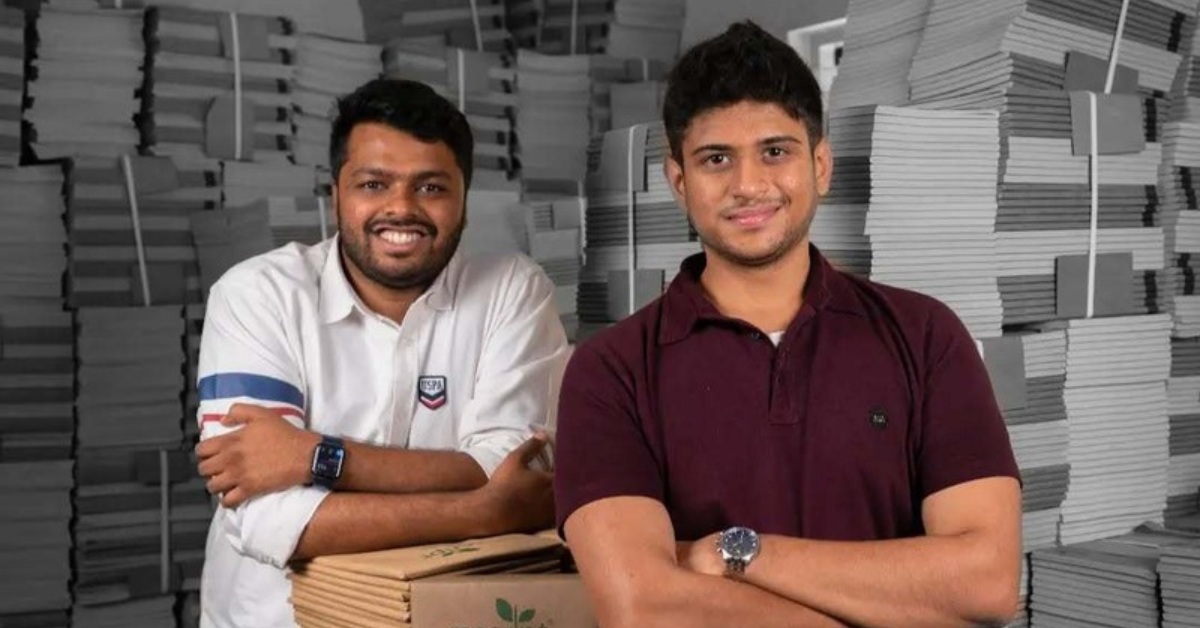 In 2021, the duo formally launched Rescript, starting with recycled copier paper
In 2021, the duo formally launched Rescript, starting with recycled copier paper
But novelty does not always translate to repeat business. The duo realised that plantable stationery was treated as a one-time gift. Even though it was impressive, companies were looking at it as a one-time buy. To build a sustainable business that has a greater impact on the environment, they needed to offer something people used daily.
That moment of clarity arrived during the COVID-19 pandemic. While offices across the country were closed, hospitals and clinics were busier than ever, and they needed paper.
Where most saw scrap, they saw an opportunity
“That is when we got the idea of selling copier paper. Paper is something we use every single day, and it can be recycled up to six or seven times, yet most of it still ends up as waste. So we thought, why not turn that missed opportunity into something meaningful?” Ashutosh says.
In 2021, they formally launched Rescript, starting with recycled copier paper. It may not have had the glamour of plantable gifts, but it had consistency and volume. Soon, they expanded into notebooks, journals, pens, and pencils, creating a full suite of sustainable stationery.
A cornerstone of their innovation is a proprietary formulation, an industry-first approach that finely mixes the ratio of recycled paper to water during production. This careful balance guarantees the resulting paper is smooth, durable, and fully compatible with modern printers, addressing long-standing issues of roughness and equipment wear that once hindered the use of recycled paper.
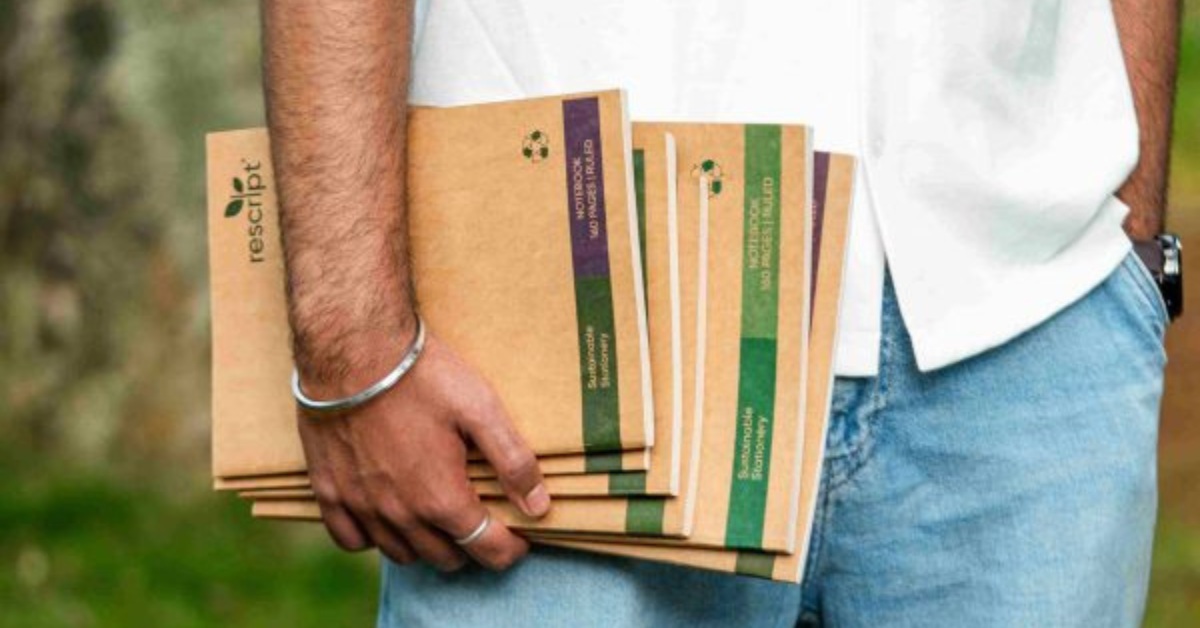 Rescript uses recycled paper to make stationery items like notebooks and journals
Rescript uses recycled paper to make stationery items like notebooks and journals
“Older recycled paper was rough, fibrous, and it used to damage printers. We solved that by designing a blend that is durable and safe for use,” explains Naren.
Paper-making process
Their process begins with the collection of waste paper, sourced primarily from packaging trimmings, textbook off-cuts, and even old student notebooks. This material is sent to an industrial mill they have partnered with under a contract manufacturing model. They do not yet have the capacity for full-scale industrial papermaking.
At the mill, the waste is segregated, then fed into a pulping machine that adds water and mixes the material into a fine paste. This pulp is flattened on a conveyor, pressed, and dried using heat to produce massive rolls of recycled paper, known in the industry as reels.
These reels are cut into A4, A3, and A5 sizes for copier paper or sent for ruling and printing to prepare them for notebooks and journals.
The reason behind no bright white papers
“We don’t use bleaching agents at all, which is why our paper is not bright white. At first, people questioned it. But now, they associate that natural tone with authenticity,” Ashutosh says.
Quality control is of utmost importance for the co-founders. At their in-house testing lab, each batch is tested for GSM, moisture, fibre strength, and uniformity. If any batch falls short, it is sent back for reprocessing. Once approved, the paper is shipped to their partnered manufacturing unit in Bengaluru, where the final products are made.
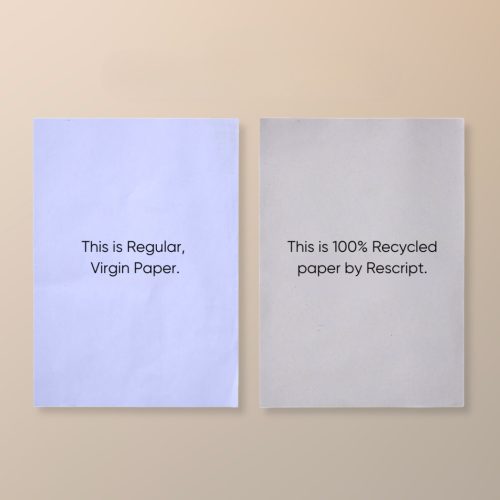 Rescript does not use any bleaching agents to make the papers white so they have the natural tone
Rescript does not use any bleaching agents to make the papers white so they have the natural tone
Adding to their commitment to sustainability, the paper also holds a Forest Stewardship Council (FSC) certification, which means it comes from responsibly managed forests that provide environmental, social, and economic benefits. It is a mark of trust that the products are not just high in quality, but also kind to the planet.
“We have invested in binding, stitching, squaring, and spiral machines at our partner factory,” says Naren. “We don’t have a Lineomatic machine for notebook production, but we have partnered with a vendor who does, and we have invested in essential machines so we can handle key parts of the process ourselves,” Ashutosh explains.
Making big moves in a small space
Inside the factory, the team begins by manually counting the sheets for each notebook. For instance, to make a 160-page notebook, workers sort and layer the required number of sheets, placing separators in between. These stacks are then placed into a chain-link machine, along with the notebook cover, where the pages are pinned together.
The notebooks then move on to a squaring machine, which flattens and aligns the edges. After that, they are sent to a cutting machine to give the notebook a neat and finished look.
Journals follow a slightly different process. “After ruling, the pages are stitched rather than pinned, and then taken to a perfect binding machine. This machine uses hot glue to bind the stitched pages to a sturdy cover, giving the journal both strength and durability,” says the co-founder.
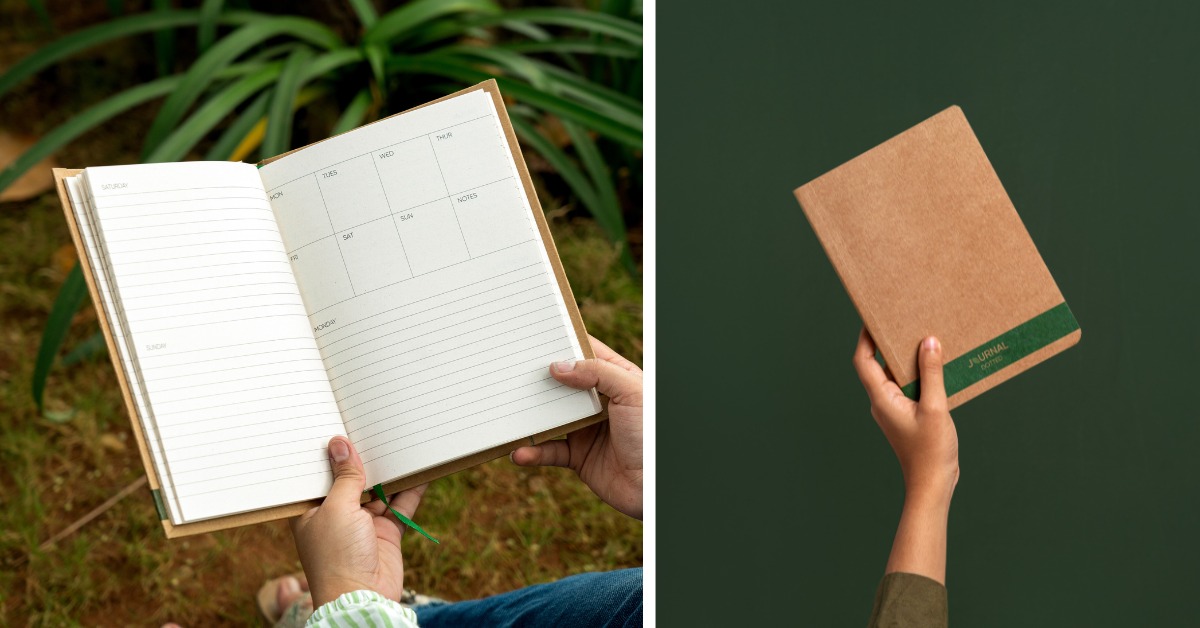 The notebooks move on to a squaring machine, which flattens and aligns the edges
The notebooks move on to a squaring machine, which flattens and aligns the edges
Spiral notebooks are made using a spiral binding machine. Once the pages are prepared, holes are punched, and the spiral wire is inserted to hold everything together securely.
Though the factory is compact, it is efficient and purposeful. Their co-partner oversees the day-to-day running of the facility, where Rescript has strategically invested in specific machinery to make sure they can maintain quality while operating within limited space.
Today, the startup offers five main product lines, including recycled copier paper, a wide range of notebooks and notepads, premium journals and diaries, pens and pencils crafted from old newspapers, and customised corporate gifting kits tailored to clients’ branding and sustainability goals.
Their B2B business serves clients like Wipro, JP Morgan, ICICI Prudential, and VMart, and they work directly with schools through distributors. On the B2C front, Rescript’s products are available in retail stores such as Sapna Book House and Crossword, and soon through Swiggy and Blinkit for quick commerce.
Ruchi Rai, Head of Science at Sanskriti The Gurukul for over 8 years, says, “I started leading the Department of Environmental Science in 2016 and have since worked to integrate sustainability into our curriculum from Classes 1 to 12. At Sanskriti The Gurukul, a 21-year-old CISCE school, we approach every resource with conservation in mind.”
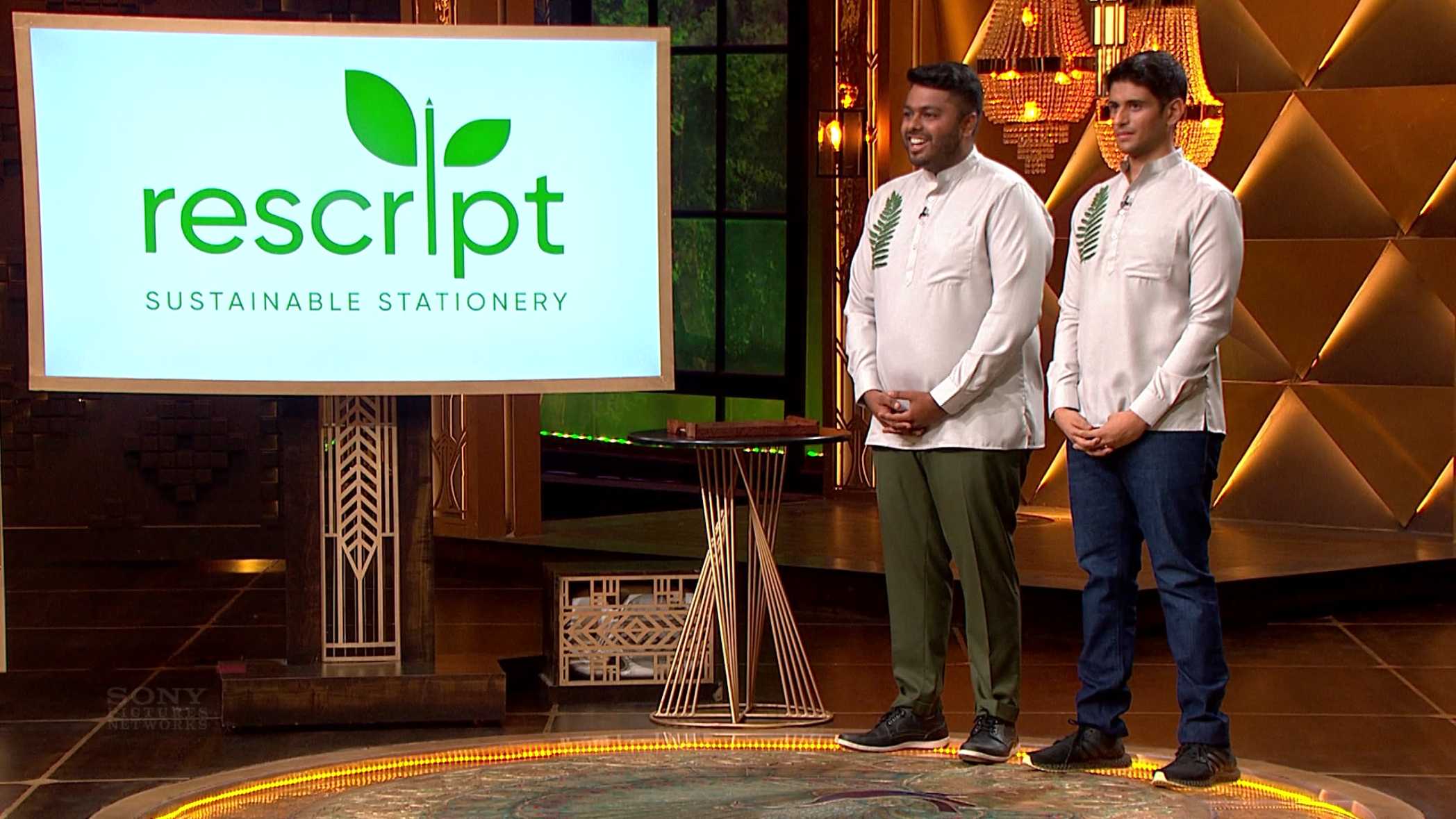 The duo appeared on Shark Tank Season 4 recently
The duo appeared on Shark Tank Season 4 recently
“One of our key projects, ‘Paper Out of Paper’, involves students recycling used notebooks into handmade sheets, a practical way to understand reuse and waste reduction. Discovering Rescript aligned with this effort, showing students how small actions can scale into impactful ideas,” she adds.
“We have introduced the brand’s notebooks across all classes and for teachers’ planning. It is encouraging to see students engaging with sustainable choices, and we believe collaborations like this can nurture both awareness and action,” she says.
‘At Rescript, we are hands-on, intentional, and honest’
Behind all this is a team of just nine. In the early days, the co-founders handled everything, from packing orders to attending sales meetings. Their first hire, Pratik Dawda, was a law student who managed their social media (part-time). He now heads the company’s entire digital and content strategy.
“We realised early on that social media would be our voice. It is how we educated our audience, gained trust, and scaled our message,” says Naren.
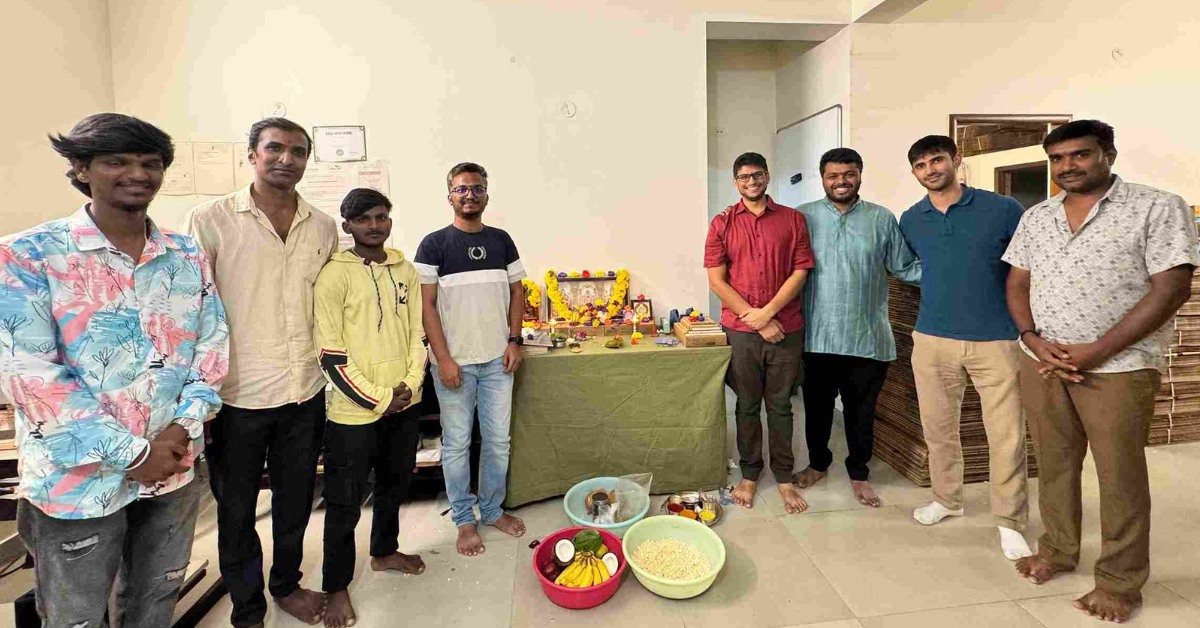 The Rescript team comprises nine people who look after the manufacturing of the stationery items
The Rescript team comprises nine people who look after the manufacturing of the stationery items
Pratik Dawda, who has been with Rescript for over 3.5 years, says, “I lead all our digital marketing efforts, including paid ads, content, brand partnerships, WhatsApp communications, and performance strategy. I also support B2B lead generation and collaborate closely with our web, product, and design teams to grow our online presence.”
“At Rescript, we are hands-on, intentional, and honest. We do not chase trends, instead, we focus on building trust around a genuinely better product. We aim to make people think differently about paper and to be memorable without being loud. Value-led storytelling, loyalty, and consistent engagement are central to everything we do,” he adds.
“For me, the brand felt like love at first sight. It is hard not to believe in a product that just makes sense, especially in a world that needs better alternatives. Seeing people make the switch and knowing we are driving that momentum is what makes this journey so rewarding,” adds the social media manager.
From zero to crores without cutting a tree
In the 2024-25 financial year, Rescript recorded Rs 5 crore in revenue, up from Rs 3.3 crore the previous year and Rs 1.5 crore the year before that. They completed 1,500 B2B invoices and more than 10,000 D2C orders last year.
Their pricing remains similar to conventional stationery, the copier paper sells at Rs 359 – Rs 400, notebooks range between Rs 50 and Rs 85, pens and pencils are around Rs 100, and journals are priced at Rs 499. For corporate gifting, customised bulk orders begin at 500 notebooks or 1,000 journals, while smaller bulk orders without customisation do not have a minimum order quantity.
One of Rescript’s standout offerings is its custom environmental impact report. After a full financial year of using their products, clients receive a detailed summary showing the number of trees saved, water conserved, and carbon emissions reduced.
“It’s one thing to say a product is sustainable. It is another way to show clients the actual numbers,” say the co-founders.
Rescript’s journey is still unfolding. But every page turned and every sheet printed is a small yet moving act of environmental responsibility. In a time when we are figuring out ways to combat climate challenges, Naren and Ashutosh believe meaningful change can begin with something as simple as the paper on your desk.
Edited by Vidya Gowri; All pictures courtesy Rescript
News